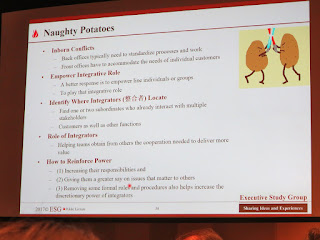The Executive
Study Group (ESG) seminar 2017 – Smart Leadership named “Getting
Your Staff to Solve Problems “Without” You” was held
by the ESG, Asia Pacific Institute for Strategy Limited (APIFS) and the
Hong Kong Science and Technology Parks Corp (HKSTP) on 22 Jun 2017. I would like to summarize the seminar for
sharing below. In the beginning, Dr. Mark
Lee briefed the history of ESG establishment and discussed the Corporate
Retreat for traditional sunset industries.
He expected that we could get some inspiration through their seminar
series.
Before the seminar, he asked two questions to participants and they were “How many of you are small potatoes in your company?” and “How many of you enjoy being a small potato?” Then he briefed the contents included “Business Complicatedness”, “Smart Leadership – six items” and “Group Discussion”.
Firstly, Dr. Mark Lee mentioned that there were too many KPIs for executives in an increasingly complex world (~ 25 to 40 KPIs committed). Complexity is not a bad thing that brings opportunities as well as challenges. He then quoted the Hard Approach from Prof. Frederick Taylor (Father of Scientific Management) about performance measures and incentives but more and more procedures added. He also quoted Soft Approach from Prof. Elton Mayo to introduce a variety of “soft” initiatives. It couldn’t help but created “Small Potatoes” because of complicatedness. Manager faced to spend 40% for writing reports and 60% for coordinating meetings.
Dr. Mark
Lee proposed to use People’s Autonomy (自主性) for Complexity (複雜性) and to create the Atmosphere
for Autonomy & Cooperation (無為而治). He
defined Smart Leadership as below diagram.
The first three items are Enabling factors under Autonomy that provides
the information needed to understand where the problems are and empowering the
right people to make good choices. The
second three items are Impelling factors under Cooperation that motivates
people to apply all their abilities and to cooperate; as well as, Thanks to
feedback loops that expose them as directly as possible to the consequences of
their actions.
Autonomy:
1.
Understand Coworkers’ “Work
Context”
There
are separated into four elements that should be understood first and they were
your coworkers’ (i) Goals, (ii) Challenges, (iii) Resources and (iv)
Constraints. Dr. Mark Lee said work context was more than Job Titles and Job
Descriptions that explained behaviors.
After
explained using hotel case, Dr. Lee asked us which element was the most
difficult one to be discovered and which one is the easiest to be
discovered. Most people selected (ii)
Challenges was the most difficult and (i) Goad was the easiest to be
discovered.
2.
Reinforce Subordinates Who Are “Integrators”
Then Dr.
Mark Lee told us that potatoes would fight each other. Therefore, we needed to identify “Integrators”
and help them obtain from others the cooperation needed to deliver more value
(e.g. stronger voice in the promotions). He suggested to empower Integrators
and supervisor should pay more attentions to the feedback of them and
recognize their importance and contributions in front of other colleagues.
3.
Add New “Power Source” to
Energize Subordinates
Dr. Lee
said usually solving the problem was from frontline staff (least power).
Therefore small potato would hide in their silos. Dr. Lee suggested (i) to give power to
increase cooperation, (ii) willing to take risks, (iii) without taking power
away from others, (iv) to create new power bases by giving individuals new
responsibilities for issues.
Cooperation:
4.
Use “Rich Objectives” to Foster Reciprocity
Dr.
Lee proposed that we relied on others to succeed together because of business
complexity that work became more inter-dependent. He said enriched the objectives didn’t mean
to add KPI but wider their scope of work.
We beware of too much clarification to reduce the feasibility. Thus, Integrators decided to balance among
many objectives.
5.
Make Subordinates Feel the “Shadow
of Future”
Then Dr.
Lee quoted Prof. Robet Axelrod (University of Michigam) that “The shadow of the
future does not reach them.” The longer it takes for the consequences of a
decision to take effect, the more difficult it is to hold a decision maker
accountable. If we bring the future
closer, people are more likely to feel the shadow of the future. Dr. Lee told
us IBM case that led Marketing people to follow Sales work and let them understand
Sales needs (work context). So that
Marketing people prepared new product information (ppt) was more directly and
simply and suitable for Sales.
6.
Put the Blame on Those Uncooperative Subordinates
Dr.
Lee suggested performing work context analysis to find out the cooperation
problem. He said that don’t totally
blame the KPI owners and it should let frontline integrator to judge which
units had contributed to solving problems.
Lastly, Dr. Mark Lee concluded that smart
leadership allowed companies to manage complexity that not by prescribing
specific behaviors, but by creating a context within which optimal behavior
occur. The results would be increased
employee satisfaction and creativity enabled.
At the end, group discussion was performed
based on two questions and they were “to pick two most difficult strategies”
and “to pick the easiest one to be used”.
Reference:
Asia Pacific Institute for Strategy Limited (亞太策略研究所有限公司) – www.apifs.org











沒有留言:
發佈留言